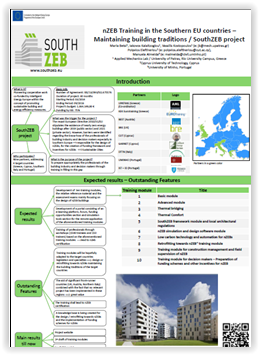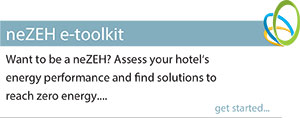nZEB Training in the Southern EU countries – Maintaining building traditions / SouthZEB project

In some countries, steps have already been taken towards this direction but not in all and especially not in southern European countries. Thus, this project aims at filling-in this gap and addresses the need of developing training and assessment schemes for intermediate and senior professionals involved in nZEB building process (engineers, decision makers, etc.). The expected outcomes of the project are:
- The development of ten training modules, the relative reference material and the assessment exams mainly focusing on the design of nZEB buildings,
- The development of a portal consisting of an e-learning platform and forum for the remote application of the aforementioned training modules, and
- The training of professionals through workshops (1500 trainees and 150 trainers) based on the aforementioned training modules, which will lead to nZeb certification.
It should be noted that the training modules developed will hopefully be adapted to the target countries’ legislation and specialties, thus the topics that will be presented aim at maintaining the building traditions of the target countries and simultaneously enable the professionals to integrate effectively new energy efficient technologies in the building sector in order to achieve nZEB criteria. It should be noted that no relevant project has been implemented in these countries and the aid of significant front-runner countries (UK, Austria, Northern Italy) and the expected results are considered to be of great value.
For the time being, the development of the training modules is nearly completed and in a few months the workshops / seminars will be delivered. Till now, professionals and associated organizations have shown great interest in the project’s results because of its value not only in preparing the professionals to face the demands of the new era, but also in creating a knowledge base for producing funding/ promoting schemes for nZEBs.









